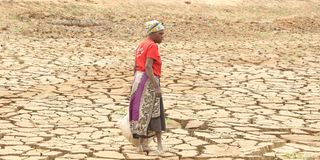Gender-related climate effects strike at the heart of households

A woman at the Kishenyi dam in Wundanyi, Taita Taveta County. Taita Taveta is reeling from the effects of changing weather patterns that have led to the drying up of two major dams that humans and livestock depend on.
What you need to know:
- Reduction in crop yields due to failing rains and declining soil fertility compels households to cultivate more land and replant more frequently.
- There is a need for meaningful gender-transformative resilience and adaptation interventions.
A recent feature story on local television showed that girls in parts of Wajir County are being mortgaged by parents to older men in exchange for bride wealth, as a coping strategy in response to the vagaries of drought.
Such girls lose their childhood, are exposed to responsibilities beyond their physical and psychological capacities, face early and protracted parenthood, are likely to suffer from problems of early maternity, lose their opportunities to get an education and experience depressed socioeconomic potential.
This brings up the question of gender-differentiated effects of climate change and the need to build this into resilience and adaptation interventions.
One of the most informative studies on this subject is Alex Awiti’s 2022 paper, Climate change and gender in Africa: A review of impact and gender-responsive solutions, which shows that gender-related effects of climate change are rooted in the roles, rights and opportunities of women relative to men, which are culturally defined and regulated by gender norms.
Climate change affects agricultural production, hence men’s and women’s time use and workloads. Under livestock production, it forces households to shift from cattle to sheep and goats. This substantially increases women’s workload since they are the primary caretakers of the smaller stock kept closer home.
Reduction in crop yields due to failing rains and declining soil fertility compels households to cultivate more land and replant more frequently. As a result, women’s workload increases at various stages of farming, such as planting, weeding and harvesting.
Decreased yields compromise overall food security and worsens women’s nutritional status, health and reproductive capacity and functions. Various studies show that because of patriarchal gender power dynamics, women often forgo food to ensure their children, men and the elderly are fed.
When unable to fulfil their traditional roles in the rural framework due to climate change, men tend to migrate to urban areas in search of alternative livelihoods, an avenue not open to many women.
Left back at home, women assume the men’s traditional roles without relief from their own. This diverts them from childcare, which could lead to negative impacts on child welfare.
In many cases, girls are withdrawn from school to assist their mothers, or frequently absent themselves, hence registering poor performance in their studies. The heavy loads that women carry, such as water and firewood on the heads and backs, contribute to musculoskeletal damages that cause reproductive complications and early onset of arthritis.
Some studies show that increases in temperature reduce women’s probability of fertility. Combined with changes in rainfall patterns, this contributes to increased prevalence of malaria, with obvious implications for infant and maternal morbidity and mortality.
Women’s care burden increases as a result of diseases affecting their dependants, thus diverting their time from productive work.
Furthermore, women who give birth in contexts of natural disaster risk adverse reproductive outcomes such as pregnancy-related high blood pressure, bleeding and premature delivery.
Due to drought, women have to walk longer distances to water sources. In the process, they sacrifice other activities or have longer days and are exposed to rape and other forms of violence. Scarcity of water has obvious effects on women’s menstrual hygiene and overall health.
It also makes the resource costlier, meaning that families forego meals or other needs to secure the commodity.
The traditional tendency in gender discourse is to emphasise the negative effects of climate change on women. However, the fact is that men are also adversely affected in fundamental ways.
Men as owners of livestock are heavily pauperised when their animals are wiped out by drought and floods. This reduces their capacity to provide for families, pulverises their material and social status and pushes them into desperate measures for survival, such as cutting down wood for charcoal burning, which are inimical to the environment.
They have to drive livestock longer distances in search of water and pasture, bringing them into conflict with other communities and often ending in loss of their lives. Exposure to hostile weather and wild animals during migration is a constant threat to their health and lives.
Physical separation from their wives for long periods of time drives men into extramarital affairs, with associated risks of sexually transmitted diseases and habitual promiscuity. The wives are not spared from this predicament either. The men’s nutritional status is compromised, having to depend on a rudimentary diet. Boys held captive in transhumance miss out on formal education and its benefits for life.
For meaningful gender-transformative climate resilience and adaptation, it is, therefore, important to conduct studies that produce exhaustive sex-disaggregated data that demonstrate how climate change affects men also. This should be followed by development of strategies that provide solutions to both groups.
The writer is an international gender and development consultant and scholar ([email protected]).





